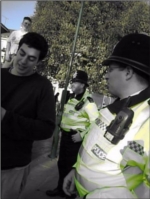|
Are people against parkour groups training in public areas?
At some of my favourite freerunning hotspots we're often approached by security guards or police officers who ask us to leave. We don't feel that we're doing anything antisocial, quite the reverse in fact - we usually attract much attention from interested passers-by who stop to watch the spectacle. So why does this happen?
When we're doing something as conspicuous and potentially dangerous as somersaulting or leaping off walls it is inevitable that we will attract the attention of not only the public but also the law! A group of lads balancing along rails and jumping across roofs can seem extremely strange and suspicious to the unenlightened. People can easily misinterpret this behaviour as having mischievous intent, and this often leads to them informing the authorities.
Perhaps the police and security guards don't understand fully what we're doing either. If you consider it from their viewpoint, it may appear that we are just gangs of youths running through the town, vandalising property and frightening little old ladies and small children as we go. Many people find groups of teenagers and young adults very intimidating, especially when they're running. It might sound ridiculous to us but think about it - this scenario is often associated with crime.
To overcome the element of negativity that surrounds parkour and gain the support of the authorities, we must all ensure we build positive relationships with our communities. We need to work hard to get it respected by the public and recognised throughout the country as a sport that benefits everyone. We need to create a link between urban sports and positive behaviour. We know that it's not our intention to damage property or endanger members of the public, or ourselves, but that's not immediately apparent to others. We must strive to educate them and demonstrate to everyone that we can act responsibly.
Obviously the most important thing we can do is discourage any overtly antisocial behaviour by our members when out Freerunning. Firstly, think carefully about the safety aspects of the moves you're planning, not just from your angle but from that of passers-by too. And also, respect public and private property. Stay off private gardens, walls, garage roofs, etc, unless they belong to you, or you've been given permission to practise there. Take care not to damage buildings, walls, fences or landscaping when in parks and other public places.
It doesn't help if you're rude or argue with security personnel or the police. It's not their fault; many have nothing against parkour, they're just doing their job. If you cause trouble it may lead to them banning it altogether. They're usually worried about damage to the property and are most likely unaware that traceurs are just as concerned about the condition of it as they are - it's to our mutual advantage to maintain the condition of these training spots.
|

But the risk of damage is not the only issue authorities have with parkour. Another, less obvious, problem is with liability. If we hurt ourselves on their land we could, in theory, sue the owners. In truth, we could easily get hurt but it would not be the fault of anyone but ourselves! However, thanks to modern society, the responsibility for our actions is not only our own.
If you are stopped and questioned about what you're doing, take the opportunity to educate and enlighten the official about parkour. You might only have that one chance to show them what traceurs are really about, so making the right first impression is key. Often, however, you'll not be given this chance. You'll simply be dismissed as trespassing youths, and told to vacate the premises. Refusal to do so is, of course, illegal and completely destroys any chance of being able to return to that spot.
There are plenty of hidden spots so there's no point fighting for one particular location. Elsewhere you'll probably find spots that are just as good. It is important to always respect the wishes of owners of the property, whether it's private or public, and remember that you may not be doing any harm but it is still trespassing if the owners do not approve of it.
Undoubtedly, unless we change the public's perception of the sport and its practitioners, we risk parkour being banned from certain places. Being denied access to town centres, playgrounds, parks and other public areas would severely limit traceurs ability to train and that, effectively, would kill the sport.
Related Articles
ParkourPhilosophy

|